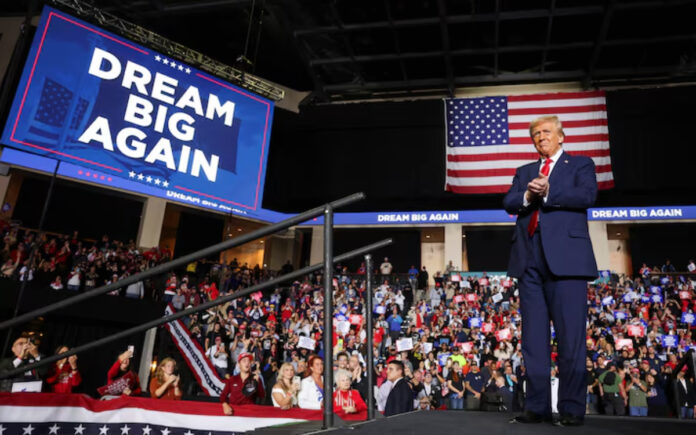Harrisburg, Pennsylvania: Republican U.S. presidential candidate Donald Trump warned on Tuesday that the European Union would face a “big price” for not purchasing sufficient American exports if he wins the upcoming Nov. 5 election. At a rally in Pennsylvania, Trump addressed his vision for trade, singling out the EU in a combative tone.
“I’ll tell you what, the European Union sounds so nice, so lovely, right? All the nice European little countries that get together,” Trump remarked, emphasizing what he sees as unfair trade practices. He went on to assert, “They don’t take our cars. They don’t take our farm products. They sell millions and millions of cars in the United States. No, no, no, they are going to have to pay a big price.”
In his campaign, Trump has championed the “Trump Reciprocal Trade Act”, proposing retaliatory tariffs to counterbalance what he deems as one-sided trade. His trade plan includes imposing a 10% tariff on all imports and an aggressive 60% duty on imports from China—a move that experts warn could disrupt global supply chains, provoke retaliation, and drive up consumer costs.
Also Read | New ‘Missile Age’ in Indo-Pacific Spurs Australia’s Defense Ramp-Up
In another controversial stance, Trump has hinted that Taiwan should contribute financially to its defense arrangements with the U.S., suggesting that the island had taken over the American semiconductor industry. Despite Taiwan’s delicate geopolitical position with China, the U.S. remains committed by law to providing the self-governed island with defense support, even in the absence of formal diplomatic recognition.
Also Read | US Welcomes India-China Border Agreement, Emphasizes No Involvement
Meanwhile, Democrat Kamala Harris, addressing a massive crowd in Washington, cautioned voters about her opponent’s intentions, framing him as a threat to democratic stability. “This is someone who is unstable, obsessed with revenge, consumed with grievance, and out for unchecked power,” Harris stated, rallying supporters in what her campaign calls her “closing argument” as the Nov. 5 election draws near.



